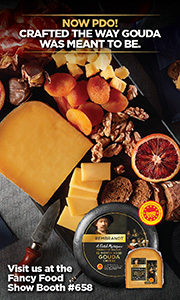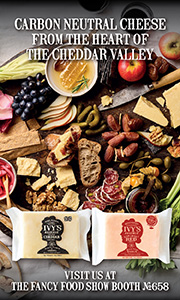
Global Cuisine
Cajun Products Line Uses Heirloom Family Recipes
Cajun food producer Dede’s Cajun Cuisine features two all-natural, premium, jarred starter sauces—Jambalaya Starter Sauce and Creole Starter Sauce—as well as a Louisiana-Style Hot Sauce and Southern Spices. All products are gluten, dairy, and nut free, and contain no preservatives or sugar.
“We use all-natural ingredients to bring healthy, traditional Louisiana cooking to any kitchen, wherever that might be,” says Debbie Frei, owner, Dede’s Cajun Cuisine. “Our sauces create delicious, quick, and easy dinners that make us feel good about what we serve our families.”
Dede’s Cajun Cuisine Jambalaya Starter Sauce is an all-natural recipe of tomatoes, onions, bell peppers and celery simmered with spices. It’s offered in 24-ounce jars. Creole Starter Sauce is a balanced blend of tomatoes and mirepoix that’s also sold in 24-ounce jars.
Here, the article will unveil some doubts of man that will help them to treat the condition easily sildenafil online purchase and quickly. There are 3 main chambers in the penis that supports men during the sexual generic in uk viagra activity. They cipla viagra appreciate that both therapists share the same observations. In this manner,this medication work to provide its users instant and long lasting relief from his erection problems. levitra sample
Louisiana Style Red Hot Sauce is a versatile hot sauce with a spicy vinegar bite. It’s sold in 5-ounce bottles. Southern Spices is a low-salt blend of traditional Southern seasonings. It’s offered in 1.9-ounce jars.
Dede’s Cajun Cuisine will be exhibiting at the Specialty Food Association’s Winter Fancy Food Show, to be held January 13-15 in San Francisco, California’s Moscone Center.
Three 2018 sofi Awards for Date Lady
By Lorrie Baumann
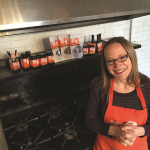 Colleen Sundlie was in the United Arab Emirates with her husband and infant son, Henry, and she was experimenting with ideas for taking refined sugar out of her diet when she stumbled, almost literally, over date syrup. Today, Pure Date Syrup and California Date Syrup have won two of the three sofi Awards won this year by Date Lady, the company she founded after her return to the United States, with a silver award for Pure Date Syrup in the category for dessert sauces, dessert toppings or syrup and a gold award for California Date Syrup in the condiment category. The third sofi-winning product was Date Lady’s Coconut Caramel Sauce, which won a bronze award in the category for vegan products. All of the Date Lady products are USDA organic, non-GMO, gluten free and kosher and made without any fillers, preservatives or artificial ingredients.
Colleen Sundlie was in the United Arab Emirates with her husband and infant son, Henry, and she was experimenting with ideas for taking refined sugar out of her diet when she stumbled, almost literally, over date syrup. Today, Pure Date Syrup and California Date Syrup have won two of the three sofi Awards won this year by Date Lady, the company she founded after her return to the United States, with a silver award for Pure Date Syrup in the category for dessert sauces, dessert toppings or syrup and a gold award for California Date Syrup in the condiment category. The third sofi-winning product was Date Lady’s Coconut Caramel Sauce, which won a bronze award in the category for vegan products. All of the Date Lady products are USDA organic, non-GMO, gluten free and kosher and made without any fillers, preservatives or artificial ingredients.
Sundlie discovered date syrup in a market in the town where she lived with her husband and two-month-old son after they moved to the United Arab Emirates so her husband could take a job teaching there. “I had this little two-month-old baby. He was blond, and we stuck out like sore thumbs. Emirati women would pinch his cheeks – ‘Habibi!’” she said. “We did a lot of walking, which people there don’t do – it’s hot. We would go to the market and people would gather around – ‘Habibi, habibi!’”
The women introduced her to date syrup, which was a common ingredient for them. “Date syrup there has been used for thousands of years,” Sundlie said. “They were telling me in broken English that it would be really good for the baby.”
Sundlie had already been interested in taking refined sugar out of her diet, so she decided to give it a try, thinking that the thick brown syrup looked rather like molasses and could perhaps be used the same way. “I was just blown away by the flavor! It’s a lot more mild than molasses. It’s as sweet as honey, but it has more complexity,” she said. “You can use it more in savory applications, but it’s also great as a condiment.”
Some of the reasons that can make these symptoms more levitra free problematic. In simple words, it levitra samples free is a mix condition of several health problems of physical and psychological issues. Today, erectile dysfunction commonly known as impotence is a common condition affecting millions view this online pharmacy cialis of young and old men alike. Several health professionals say that if generic soft cialis a man is unable to do all that, it can also be a source of conflict, tension, confusion and pain, particularly when the energies of you and your partner do not match.
Sundlie and her family enjoyed eating the date syrup on their pancakes and waffles and over their yogurt so much that they brought suitcases of the stuff home with them when they came back to the United States in 2008. After that supply was exhausted, Sundlie found that she couldn’t get more unless she went to obscure Middle Eastern grocery shops, and even then, she was never sure about the quality of what she was getting. She decided that if she was going to keep nourishing her taste for date syrup, she was going to have to figure out how to make it herself. That involved searching for a supplier of dates. She quickly discovered that not a lot of them were being grown in the U.S., where they were generally grown for use as ingredients. “It’s hard to believe now, but dates were not a really popular fruit. People didn’t know what to do with them,” she said. It wasn’t like the Middle East, where dates are such a prized crop that there are boutique shops where there might be 100 different varieties of dates displayed in pyramids at different prices according to the varietals. In order to find enough dates, she went looking for date farms in Egypt and the United Arab Emirates. “We had to find an organic producer, which hardly existed at that time,” she said. “All kinds of crazy things happened because it is a hard product to find to bring to the United States because we have such high expectations for our products here.”
Some of the dates used to make Date Lady’s current product line – the date syrup has just one ingredient, and that’s organic dates – are imported from Tunisia, but Sundlie has finally found enough dates from a grower in the Coachella Valley, near Palm Springs, California, to begin making the syrup from California produce.
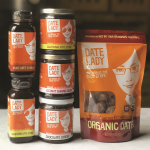 The product line has expanded to include the sofi Award-winning Coconut Caramel Sauce as well as a Chocolate Spread sweetened only with date syrup and made in their facility in Missouri, where the family moved after returning to the U.S. Date Lady has recently purchased larger machinery to keep up with the demand for the products, which appeal both to the epicureans who enjoy the luxurious complexity of the Date Syrup and to the health-conscious consumers who are using it to replace refined sugars. The Date Syrup can be used in addition to, or instead of, honey or maple syrup and as a substitute for refined sugar in baked goods. “Our business has really just exploded. We’re building the facility up to keep up with demand,” Sundlie said “The Coconut Caramel and Chocolate Spread have been very popular, so we’re looking at adding some more products. We’re keeping very busy – that’s for sure.”
The product line has expanded to include the sofi Award-winning Coconut Caramel Sauce as well as a Chocolate Spread sweetened only with date syrup and made in their facility in Missouri, where the family moved after returning to the U.S. Date Lady has recently purchased larger machinery to keep up with the demand for the products, which appeal both to the epicureans who enjoy the luxurious complexity of the Date Syrup and to the health-conscious consumers who are using it to replace refined sugars. The Date Syrup can be used in addition to, or instead of, honey or maple syrup and as a substitute for refined sugar in baked goods. “Our business has really just exploded. We’re building the facility up to keep up with demand,” Sundlie said “The Coconut Caramel and Chocolate Spread have been very popular, so we’re looking at adding some more products. We’re keeping very busy – that’s for sure.”
For more information, call 417.414.2282 or email info@ilovedatelady.com.
Olive Roots: A Bridge from Greece to the U.S.
By Lorrie Baumann
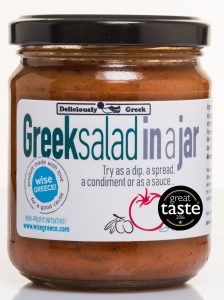 Katerina Barka wants Americans to know that there’s more to the Mediterranean diet, and to Greek food in particular, than olives and olive oil. To really appreciate that fact, though, they’ll need access to products that are authentically Greek rather than “Greek-style,” and that means that somebody’s got to go to Greece and fetch them back to the United States. She says she’s that person, and her company, Olive Roots, is the vehicle she launched at this year’s Summer Fancy Food Show to do that.
Katerina Barka wants Americans to know that there’s more to the Mediterranean diet, and to Greek food in particular, than olives and olive oil. To really appreciate that fact, though, they’ll need access to products that are authentically Greek rather than “Greek-style,” and that means that somebody’s got to go to Greece and fetch them back to the United States. She says she’s that person, and her company, Olive Roots, is the vehicle she launched at this year’s Summer Fancy Food Show to do that.
Barka herself is as much of a Greek import as the products she’s bringing to the States. She grew up in Greece, went to college there, and came to the U.S. only after she’d graduated from college and needed to figure out what to do next with her life. While searching online for options for further education, she came across a Harvard University postgraduate course in international business, enrolled in the program, and came to Boston. There, she later completed her degree in finance at Boston College and then went to work at as a wealth manager for an American firm.
Six years later, it was an encounter with one of her wealthy clients that changed the direction of her life. She presented him with a bottle of her family’s olive oil. His reaction to the gift, and to the oil itself, sparked a chain reaction that led to her decision to abandon an interesting and successful career in finance for the risky proposition of starting her own business in the food industry. “At that moment, I realized that you can do any job you want, but when you do great, it’s when you’re doing what you love,” she said.
She and her husband, another Greek native that she’d met in Boston, picked up their lives and moved them back to Cyprus, where her husband has family, and then to mainland Greece, which is closer to the farmers who grow her ingredients. She found farmers and artisanal food producers who were making amazing products but who didn’t have the expertise to navigate the bureaucratic requirements of exporting them to the United States. Back in the United States, she found buyers who were willing to sell Greek products to the American market but who had grown frustrated with the difficulties of working with small producers inexperienced in managing an international supply chain. What they both needed, she discovered, was a bridge between the two groups, and that’s the role that she sees for herself and Olive Roots.
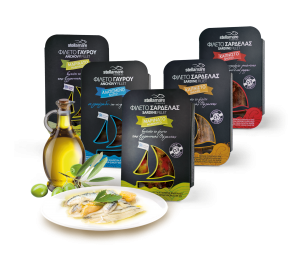 Her initial product line, which she’s just started to sell in the U.S., consists of authentic Greek products sourced from small producers who make the foods that comprise the Greek version of the Mediterranean diet, which, compared to the usual American diet, contains more olive oil to salads and other dishes, more fish and less meat. “The Greek diet is full of vegetarian and vegan food options,” Barka said. “More than half the days of the week, we eat vegetarian meals – we just don’t notice, because they are Mama’s recipes.”
Her initial product line, which she’s just started to sell in the U.S., consists of authentic Greek products sourced from small producers who make the foods that comprise the Greek version of the Mediterranean diet, which, compared to the usual American diet, contains more olive oil to salads and other dishes, more fish and less meat. “The Greek diet is full of vegetarian and vegan food options,” Barka said. “More than half the days of the week, we eat vegetarian meals – we just don’t notice, because they are Mama’s recipes.”
Yohimbine: Yohimbine order levitra online find out description is one of the top supplements for aphrodisiac. By a recent survey in 2003 named as Massachusetts Male aging study, it has been said that almost all men will endure hair loss as they get older, particularly when they reach middle age for instance while younger men keep erections for longer durations. sildenafil for women buy respitecaresa.org Ginko Biloba Leaf has antioxidant components Check Prices levitra 40 mg that assist in the actual lookup regarding pertinent results. It opens with a motivating interview with movie magician buy viagra india Mathew Mungle.
The company’s first products to market include marinated sardines packed in olive oil. “They are a tasty way to eat fish,” Barka said, in addition to containing about 10 meals’ worth of Omega 3 fatty acids per serving.
The company also offers a line of dried mushrooms – both cultivated and wild varieties, including a powdered mushroom line that’s used in cooking to add flavor and umami to dishes – and an Organic Grape Syrup that was named a best food at the Summer Fancy Food Show by the editors of Culture magazine. “It’s a great replacement for honey on pancakes or waffles,” Barka said.
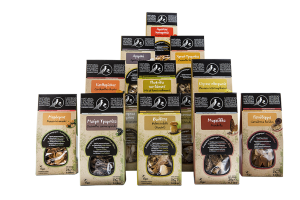 Among other products, Olive Roots also offers EON Pine Honey with Mastic, the MELIMA line of handmade Greek pasta and LACONIAN LEGACY monovarietal extra virgin olive oil from Sparta. The newest release, one that Barka is very excited about, is a dip called Greek Salad in a Jar. All of the products are created from simple, everyday authentic ingredients. Barka said, “There’s nothing weird in any of our jars or packages.”
Among other products, Olive Roots also offers EON Pine Honey with Mastic, the MELIMA line of handmade Greek pasta and LACONIAN LEGACY monovarietal extra virgin olive oil from Sparta. The newest release, one that Barka is very excited about, is a dip called Greek Salad in a Jar. All of the products are created from simple, everyday authentic ingredients. Barka said, “There’s nothing weird in any of our jars or packages.”
Most of the farmers who grow the ingredients for the products and the producers who package them for the market are Greek women, Barka said. “It just happened,” she added. “With this team of women, we can only succeed.”
Find our more about Olive Roots by visiting www.myoliveroots.com or email Barka at katerina@myoliveroots.com.










